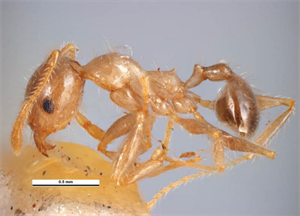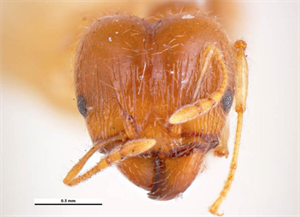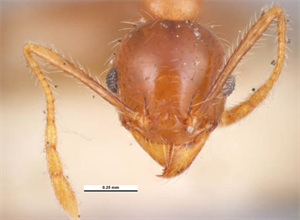- Worldwide distribution. Common in Pacific island countries. Among world's 100 worse invasive species.
- Nests under logs, stones, tree bark, leaf litter, and occasionally in houses. Prefers disturbed areas. Eat seeds, other insects, small lizards and birds, and honeydew. A scavenger. Once colonises established, biodiversity declines.
- Direct damage to agriculture seeds and plant parts; indirectly by defending aphids, mealybugs, scales and whiteflies from natural enemies.
- Queens mate inside colony. Workers are 'major' (big-headed soldiers) or 'minor' (much smaller workers) that rear the brood.
- Tramp ant; spread by 'budding' - queens, workers and brood move to new sites. Spread with international trade.
- Biosecurity: requires risk assessments, regulations preventing introduction, protocols in case of breaches, and ability to make rapid response. Pacific Ant Prevention Plan available (IUCN/SSC Invasive Specialist Group).
- Cultural control: hot water at 47°C kills ants; over 49°C kills plants.
- Chemical control: use (i) stomach poisons (fipronil, Amdro®, borax), (ii) growth regulators (methoprene, pyriproxyfen), (iii) nerve poisons (bifenthrin, fipronil, imidacloprid). See (http://piat.org.nz/getting-rid-of-ants).
Pacific Pests, Pathogens and Weeds - Online edition
Pacific Pests, Pathogens, Weeds & Pesticides
Big-headed ant (361)
Big-headed ant, African big-headed ant, coastal brown ant.
Pheidole megacephala
AUTHOR Grahame Jackson
Information from CABI (2018) Pheidole megacephala (big-headed ant). Crop Protection Compendium. (https://www.cabi.org/cpc/datasheet/40133); and Pacific Invasive Ant Toolkit. (http://piat.org.nz/ant); and Pheidole megacephala. AntWiki. (http://www.antwiki.org/wiki/Pheidole_megacephala); and AntWeb. (https://www.antweb.org/description.do?rank=species&genus=pheidole&name=megacephala); and from Pheidole megacephala (2018) Global Invasive Species Database. (http://www.iucngisd.org/gisd/speciesname/Pheidole+megacephala). Photos 1-3 Simon Hinkley & Ken Walker (2006) Coastal brown-ant (Pheidole megacepahala). Museum of Victoria. PaDIL - (http://www.padil.gov.au).
Produced with support from the Australian Centre for International Agricultural Research under project HORT/2016/185: Responding to emerging pest and disease threats to horticulture in the Pacific islandsduction, implemented by the University of Queensland and the Secretariat of the Pacific Community.






